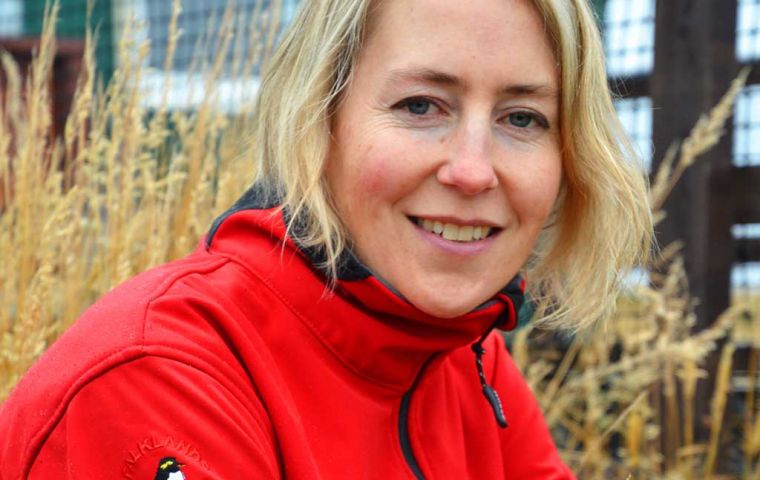MercoPress. South Atlantic News Agency
Falkland Islands celebrates World Earth Day and its challenges
 Falklands Conservation CEO Esther Bertram
Falklands Conservation CEO Esther Bertram April 22nd is World Earth Day, and three leading Falkland Islands experts in the environment and protecting our planet's scarce resources addressed the issue. They are Esther Bertram, CEO of Falklands Conservation, Dr. Paul Brickle Executive Director of the South Atlantic Environment Research Institute, SAERI, and Dr. Rachel Cooper, Head of the Falkland Islands Government Environment Department.
Providing for future generations
Falklands Conservation CEO, Ms Bertram started by pointing out that the wildlife in the Falkland Islands is phenomenal, globally important, and locally important since it “sort of drips off the Islands, we are truly fortunate, we don't need binoculars to see it, so we need to really do all we can to reduce any pressure on the natural environment, on our nature here”.
“From our perspective as a conservation organization, we're really keen that we, and others can do for the protection and conservation on the ground, that's really applied and that can really make a difference”.
“We know that there are issues, and we know that we need to do about them, and we need to invest in doing that work and that might involve large scale restoration”.
“It may be ensuring that we have good enough targets and we can also put in protection for our marine environment; our inshore environment is currently pretty pristine, and that's where are key industries are dependent, our fisheries and our tourism. And so we need to ensure we have strong protection that's going to provide for the future for the next generation”.
We need to change our behavior
For Dr. Paul Brickle, Executive Director of South Atlantic Environment Research Institute, SAERI, “I think that as regards to drying, we need to understand what is going to happen, and we need some climate change impact assessment of what's going to happen to the Falkland Islands, and that's the really important bit: to allow climate change to be mainstreamed into policy, but also to allow us to think how we can become resilient to it, what we need to improve our water security for example. And there are many options out o us.
”It's not necessarily all doom and gloom, but we would have to change our behavior, whether that's land use behavior, whether that's other ways of to capture water or what have you... But until we understand what the baseline is, and what's likely going to happen, then that's difficult to be able to be in a position to be resilient.”
Environment policy written into legislation
Finally Dr. Rachel Cooper, Head of the Falkland Islands Government Environment Department said that the long term ambition for the Falkland Islands is the environment strategy, with 15% of our marine areas, as marine managed areas.
And so that is also reflected in the Islands Plan towards developing the policy to make that a reality and eventually be written into legislation, so it'll be great to see those areas created not to affect our natural environment in the future.
It's really exciting to be working towards those kind of key ambitions over the next four years and incorporating the community as well and taking everyone along for the journey.
So I'm looking forward to that.




Top Comments
Disclaimer & comment rulesCommenting for this story is now closed.
If you have a Facebook account, become a fan and comment on our Facebook Page!